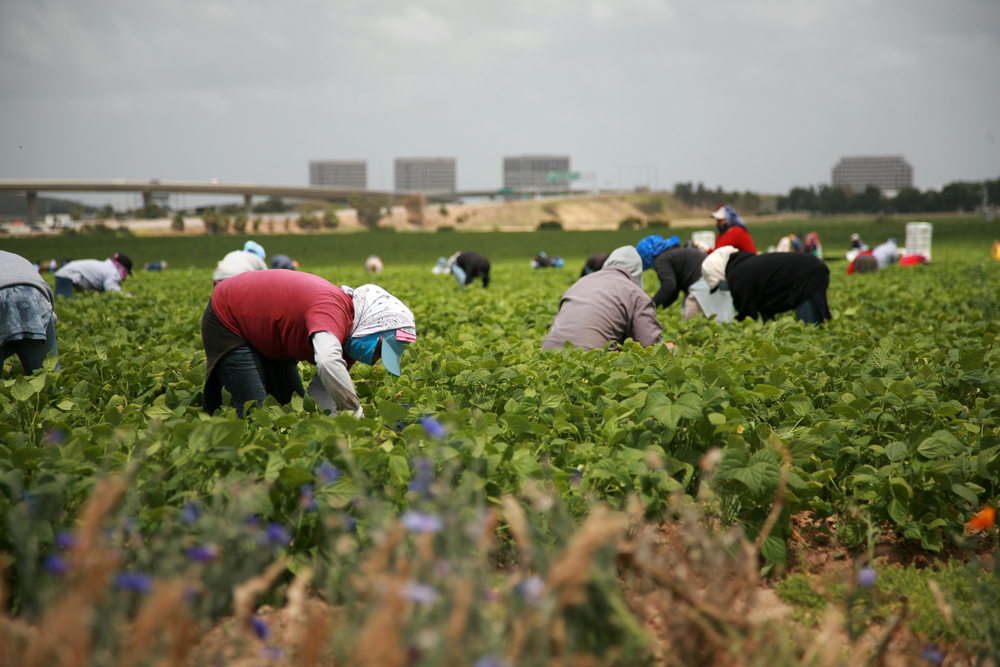It’s not just the meat plants that we need to worry about.

Picking crops shoulder-to-shoulder and sleeping in crowded barracks of 10 to 20 people have long been routine conditions for farmworkers in the US. But as COVID-19 has spread into rural areas these conditions have been ripe for new outbreaks that could threaten the food supply chain.
In recent news, a farm in Tennessee discovered that all 200 of its workers were infected with the virus. In New Jersey, 110 fell ill due to outbreaks in two neighboring counties. A tomato and strawberry greenhouse in Oneida, New York had nearly 170 confirmed cases of the disease among its workers. An outbreak at the end of May impacting 48 people on an Oregon fruit farm has also travelled through three different locations. And Washington State’s Yakima County, known for apple, cherry, pear and hop production, has the highest per capita infection rate of any county on the West Coast.
Farmworker advocates like Iris Figueroa, say the virus has potential to spread deeper into rural areas and there are a number of impacts that will reach as far as your kitchen table. Figueroa, a senior attorney with Farmworker Justice, compares it to what’s been seen from outbreaks in meatpacking facilities.
“If you have these massive outbreaks that will lead to a shortage of workers, it could affect the food supply,” she says. “If the safety and health of the workers aren’t enough to motivate people to create better conditions, then at least the concern for their own food supply and health should.”
As some crops have a small window of time they can be harvested, a shortage of workers could mean a shortage of produce and higher prices in the grocery stores. Some farmers have had trouble getting the temporary foreign workers they need into the country since the pandemic hit, but there were reported farm labor shortages even before. The farmworkers, who still came despite the pandemic, have often had to deal with a lack of hand soap, N95 masks and other protective equipment.
Fear is another factor.
“We’ve actually been hearing anecdotally that employers are actively telling workers don’t get tested. If you come back positive, you will get fired,” Figueroa says. “Or telling the migrant health centers you have to tell them to quarantine, but I’m not going to pay them. So there is a disincentive for workers to come forward and say that they’re sick.”
Currently there are two to three million farmworkers in the US, and many of them are undocumented. The US Department of Labor estimates that almost 50 percent of that workforce are undocumented, but others put that number much higher at 70 percent. The fear of deportation can deter undocumented workers from accessing the healthcare they need if they get sick, or even to get tested.
Critics have said the government has been falling short on its protections for workers. The Families First Act, passed by Congress, requires that employers provide two weeks of paid leave. However, farmworkers employed by larger farms of more than 500 workers are exempt from paid leave-provisions and those who lack legal work authorization wouldn’t be able to access those benefits anyway.
Language barriers are another issue, as the majority of farmworkers’ first language is Spanish. Government and state health departments are offering little to no information in Spanish. A United Farmworkers of America Facebook Live event attracted roughly 18,000 viewers with hundreds of farmworkers commenting that their employers had not provided information on best practices.
California Democratic Congressman Jimmy Panetta, along with 71 other members of Congress, sent a letter calling on House leadership to create rules to protect workers. They asked that the federal government fund grants that would provide more protective equipment for farmworkers, free COVID-19 testing for them, and suitable education and training around the virus.
Figueroa says that there also needs to be some additional economic relief passed by Congress, which actually includes undocumented workers. The current support, she says, is not enough because those farmhands who are undocumented do not receive tax rebates or unemployment insurance.
“When there is an economic reality that you need to work to feed your family, then you’re going to be more likely to take a risk and not speak up about unsafe conditions, because you feel like you don’t have a choice,” she says.
Many of the problems concerning working conditions for farmworkers aren’t new, says Figueroa, but the virus has exacerbated and highlighted them. She adds that until they get addressed, the situation has great potential to get worse.
In the 60’s, we were migrant workers. We were yyoung and worked to help our families. We had farmers that provided housing with butane stoves to cook. Some houses were good , others were old horse stalls but overall, we did okay. Main reason for this is that we would stay with the same farmer all those years, in different states. We had a mother that showed us that this was not the life to live but we worked hard to bring home money. Clothes, several times mom would walk into a car dealership, talked only Spanish and I was… Read more »